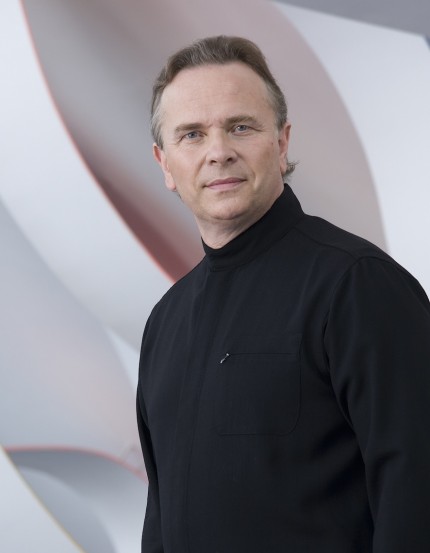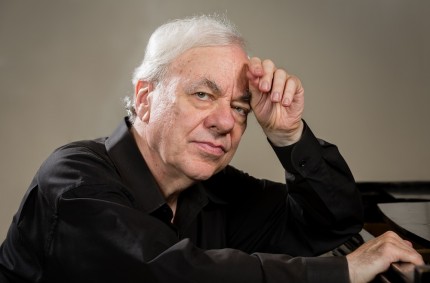Ives’ raucous, subversive symphony highlights rewarding CSO program

The variable scheduling elements of the Chicago Symphony Orchestra’s spring calendar have conspired to offer something much needed on the local music scene—a mini-festival of great American symphonies.
Last week, Leonard Slatkin led the belated Chicago premiere of William Schuman’s craggy and powerful Symphony No. 6 in a program of American music, revealing this work as one of the handful of homegrown symphonic masterworks.
On Thursday night, Sir Mark Elder was on the podium at Orchestra Hall for Charles Ives’ Symphony No. 2—the first great American work in the genre and one of the pioneering Yankee composer’s most lasting inspirations.
Charles Ives was an unlikely figure to spearhead American music. A successful insurance executive and weekend composer, Ives envisioned a national style that melded populist domestic music into the European tradition. Much as Gershwin did later with jazz and like contemporary composers who incorporate rock elements, Ives mined the popular musical forms of his day.
The Second Symphony draws on fragments from Stephen Foster songs, hymns, marches, collegiate anthems, and patriotic odes (Camptown Races, Columbia, the Gem of the Ocean, Bringing in the Sheaves, and Massa’s in the Cold, Cold Ground are heard among others). The final movement is the most Ivesian, its headlong energy, simultaneous punched-out themes and the final chord’s rude blat reflecting a subversive anti-authoritarian streak in the national fabric.
And yet in Ives’ anarchic grab-bag of 19th-century Americana there is also a striking harmonic and contrapuntal sophistication and, at times, a heart-stopping beauty. The opening Andante feels strongly rooted in American transcendentalism, a musical reflection of Emerson and Thoreau. And the central Adagio plumbs a vein of deep sadness that is an integral trait of the finest American music (think Copland’s Appalachian Spring, David Diamond’s wartime symphonies, or Corigliano’s First Symphony).
Gratitude at hearing this cornerstone of American music was mingled with regret that it hasn’t been played by the CSO in over three decades (Michael Tilson Thomas led the last downtown outing in 1981.) Let’s hope another 33 years don’t pass before this symphony is played again.
Elder spoke briefly about the music and Ives’ Second is clearly a score he cares deeply about. The British conductor’s approach is about a 180-degree turn from Leonard Bernstein’s path-breaking two recordings (Sony and DG) with the New York Philharmonic.
It was Bernstein who gave the belated world premiere of the symphony in 1951, more than four decades after it was written. Lenny’s advocacy was focused on selling this work to a skeptical audience and wringing every last drop of emotion and nostalgic ache out of the music, even if it meant a rather free approach to the score.
Elder’s lithe, light-textured approach showed more fidelity and largely let the music speak for itself. Still, at times, the tricky balances seemed off Thursday and one felt some of the high points were underplayed to the point of not even registering. The snatch of America, the Beautiful at the climax of the Adagio and the antic Reveille trumpet breakout in the crazed final bars were barely discernible in Ives’ hectic collage. Also one felt the orchestra was feeling their way through the music at times, unsurprisingly since Ronald Reagan was in his first term as president at the time of the last CSO performance.
Still, the players responded with characteristic polish, energy and intensity. Elder brought out the wistful expression of the slow movement and the finale, while lacking cumulative momentum, ultimately delivered the goods—the trombones standing for their raucous climactic peroration of Columbia, and the dissonant final chord making full strident impact and eliciting smiles in the orchestra’s ranks.
Even more than at last week’s well-received American program the Ives received enthusiastic applause and prolonged cheers. I had a conversation with a young man at intermission who greatly enjoyed the Ives performance. “The CSO plays too much 19th-century music,” he said. “Why can’t they do pieces like this more often?” Why not indeed.
Mozart served as the palate cleanser between the evening’s two boisterous works. As fine an artist as Mitsuko Uchida is, it’s good to hear other pianists in this repertory, especially one of Richard Goode’s caliber.
The American pianist’s rendering of Mozart’s Piano Concerto No. 23 was truly the art that conceals art. His Mozart is more forthright and—if we’re still allowed to say this– “masculine” than Uchida’s, yet remains a model of Classical style–lucid, tasteful and pure of tone.
Goode plumbed the introspective reverie of the Adagio with refined sensitivity. The CSO winds (Mathieu Dufour, David McGill, and Stephen Williamson back for this week) were placed forward next to the violins by Elder, and lent equally elegant and close-knit support. The finale’s main theme is one of Mozart’s happiest inspirations, and Goode’s playing was in equal touch with the vitality and graceful bonhomie. Elder judged the back and forth between the soloist and ensemble deftly, and the performance was rounded off in exhilarating fashion.
For a program that could have been titled “Wit and Humor in Music,” Richard Strauss’s Till Eulenspiegel’s lustige Streiche was an apt finale. If the Ives felt a bit reined-in at times, there were few inhibitions in Elder’s full-blooded performance of Strauss’s massive comedic scherzo. Rarely will one hear the title prankster painted with such personality-plus contributions from all sections, from Daniel Gingrich’s horn solo of Till’s motif, to Eugene Izotov’s insouciant oboe.
The program will be repeated 8 p.m. Saturday. Gerard McBurney, Sir Mark Elder and the CSO will present a “Beyond the Score” program examining Ives’ Symphony No. 2, which will include a complete performance of the work 7:30 p.m. Friday and 3 p.m. Sunday. cso.org; 312-294-3000.
Posted in Performances






Posted Apr 25, 2014 at 4:36 pm by Frank Monnelly
Mark Elder is one of my favorite guest conductors. He always brings a piece not in the top one hundred that is a joy to hear. The Ives is the latest in a long line that includes his Dvorak festival and the Arnold Bax Spring Symphony.
He always makes me eager for his next visit.
Posted Apr 25, 2014 at 10:29 pm by Odradek
The CSO really needs to get a regular guest conductor (maybe principal guest) who specializes in American music, and/or in stuff which falls outside the standard European rep. The audience enthusiasm is definitely there.
Posted Apr 26, 2014 at 12:27 pm by mbh
I was thinking that if Muti had not been named the CSO’s principal conductor, Sir Mark Elder would’ve been an excellent and logical choice. I have always enjoyed every performance with him at this and the Lyric Opera podium. Here is a serious conductor who still knows how to have fun with the orchestra and good rapport with his audience.
Interesting as well that it took an English conductor to bring Ives’s much too neglected symphonic masterpiece to American audiences. I saw it as part of the Beyond the Score series, so I had the added treat of hearing Ives’s own words and those dramatized and given fresh insight by Gerard McBurney and company.
The Second Symphony is both accessible and far-reaching, a panorama of 19th century Americana, Bach and Brahms, all blended into a magnificent symphonic stew. How could one not feel anything but American when listening to this music?
It’s amazing to think that many of the same Protestant hymns, especially those of Lowell Mason, can be found in modern church hymnals and are still sung by congregations. Sadly, so many of the great SC Foster songs have fallen by the wayside, but the glimpses of several given by the ensemble of singers whetted the appetite for more.
Three cheers to the CSO for two weeks of American masters!
Posted Apr 26, 2014 at 3:38 pm by Lawrence A. Johnson
A further note on Charles Ives for those traveling to New York. The American Academy of Arts and Letters has transported the composer’s original studio from Danbury, Connecticut to its New York museum as a permanent exhibit—disassembling and rebuilding every stick, down to the pencil shavings.
Read about it here: http://newyorkclassicalreview.com/2014/04/with-his-studio-transplanted-charles-ives-music-lives-again-at-the-american-academy-of-arts-and-letters/
Posted Apr 26, 2014 at 4:04 pm by Chuck Burkhead
I will just add a strong endorsment to the latest comments (by mhb) about last night’s Beyond the Score performance. Although there were some empty seats around, the younger constituency last night (student tickets?) added a lot of energy to the deserved ovations at the end. Certainly Mr. Ives and Americana were well launched, solidified for a new generation. Kudos to the creative team, stage artists, and excellent singers last night. Knowing the intent of the composer (thorough his words, experiences and intent) made the post-intermission complete performance even more revelatory and exciting.
The beginning of the second movement was as beautiful and moving as anything I’ve heard at Orchestra Hall in the last few years. Almost reminiscent of Elgar’s best work to me–and Copland, maybe Barber. Overall, the refinements, balances, contrast were all in place last night. It was an “A game” evening for the CSO.
Posted Apr 27, 2014 at 8:39 am by cynthia
I recently moved from San Francisco, where I was an avid patron of the San Francisco Symphony. Since arriving in Chicago, I have been equal parts amazed by the amazing artistry of the CSO, and also the dull, conventional programming. This performance brought the amazing artistry together with interesting engaging programming to wonderful effect. Made me had a bit of faith that we could find a musical home with the CSO. Perhaps the trick is to focus on the concerts by the guest conductors rather than Muti; the concerts I’ve seen conducted by him have been a total snooze.
Posted Apr 27, 2014 at 5:08 pm by Odradek
Cynthia: you should have been here in the 90s, when the Barenboim / Boulez regime was a guarantee of challenging programming. While I have nothing against Muti as a conductor, his programming is old-fashioned to a fault.
Posted May 05, 2014 at 5:53 pm by Joan Staples
I don’t find Muti old-fashioned! Yes, he did a lot of Schubert this year, but we haven’t had a lot of Schubert in the past. CSO has the Music Now series, and many opportunities for different music these days, in contrast to some other orchestras. Re the audience on April 26 for the Ives: in the audience was a large group of music students from a high school in Royal Oak, Michigan. The mother of one student sat next to me (we are long subscribers). The students were serious and enthusiastic listeners. They had prepared all year for this opportunity, which included a weekend full of activity, including music. I think we have to balance new music with pieces from the past. But there are many past masterpieces we can choose from, which are seldom heard.